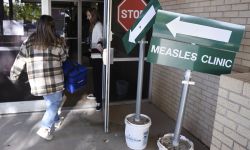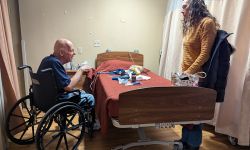Coronavirus fears shutter Michigan university classrooms


The impact of coronavirus struck Michigan college campuses Wednesday, as the state's public universities announced in quick succession that students were no longer to attend classes in person, and encouraging students to leave in an effort to slow the spread of the potentially deadly virus.
The move left 15 campuses and more than 250,000 students in limbo, either on extended spring break, looking for rides home, or wondering how they would complete their classwork for the semester online.
Among private universities, Lawrence Technological University in Southfield said Wednesday it would extend spring break by a week, to March 22, and teach classes online from March 23 to March 28. During that time, the school is closing its cafeteria and delivering meals to individual dorm rooms.
Community colleges also scrambled to figure out how to offer classes online, said Michael Hansen, president of the Michigan Community College Association. Hansen said he expected some community colleges to make announcements next week that some classes were switching to online.
- These Michigan colleges shut down because of coronavirus concerns
- At Michigan State, deciding whether to go home or stay for the meal plan
Public K-12 school districts have not closed as of early Wednesday evening.
But many are rushing to put emergency plans in place in case decisions were made to shutter their buildings. The Tri-County Alliance for Public Education, a coalition of K-12 school leaders, fired off a letter Wednesday to State Superintendent Michael Rice asking for guidance from the state on how a potential short- or long-term school shutdown would affect things like end-of-year standardized tests.
West Bloomfield School District, in Oakland County, where one of the state’s two confirmed coronavirus cases is a resident, announced that it is closing Friday to give staff time to develop a plan for online learning in case it is needed. Students and staff are currently expected to return to normal schedules on Monday, March 16.
In the 20 hours following the announcement late Tuesday of Michigan’s first two confirmed cases of coronavirus, classes were either canceled or switched to online-only at all state universities.
Related stories:
- Coronavirus Tracker: What Michigan needs to know now
- Michigan reports first two coronavirus cases, in Wayne and Oakland counties
- As Michigan braces for coronavirus, H1N1 quietly makes a comeback
- How to prepare for coronavirus in Michigan. Step 1: Breathe
The shuttering of college campus classrooms Wednesday was unprecedented and, with the exception of Michigan State University, was done even before any coronavirus cases were linked to staffers or students at those schools.
MSU told students in an email alert that a person “linked to the campus” had been diagnosed as a “probable case” of coronavirus by the Ingham County Health Department. The health department had not confirmed the diagnosis early Wednesday evening, which would make it Michigan’s third confirmed case.
In an emergency phone call with the presidents of Michigan’s 15 public universities Wednesday, Gov. Gretchen Whitmer encouraged tele-learning as a way to slow the spread of the virus.
“We must do everything we can that will protect our students,” Whitmer said later Wednesday at a news conference held online to further avoid a group gathering.
Some universities announced the shuttering of in-person classrooms before Whitmer’s phone call; some told Bridge they wanted to wait to see what guidance the governor would offer to the universities, which each operate independently.
The full impact of the in-person class closings, which many expected to expand in coming days to more universities and colleges and some of Michigan’s network of community colleges, was difficult to fathom for Dan Hurley, president of the Michigan Association of Public Universities, which represents the state’s 15 public universities.
“It has been a fast-moving train, and it keeps getting faster, particularly in the last 24 hours,” Hurley said. “Many factors are going into these decisions. First and foremost is the health and safety of all who engage with the campuses.”
Michigan State University was first out of the gate, announcing mid-morning Wednesday that the campus was stopping all in-person classes at noon that day. Classes will continue online, according to a release from the university.
Instead of completely closing, MSU and other universities announced plans to move classes online. MSU encouraged students to leave campus and return to their permanent homes, but dormitories and cafeterias will remain open for those who do not want to leave, or are not able to leave.
The length of the halt to in-person classes varied by school, and universities made clear that online learning could be extended if concerns about coronavirus extend beyond the current end-date.
Moving classes online got off to a shaky start at MSU Wednesday. Carolina Vargas’ first two classes were canceled because the professors didn’t have time to put their lectures online. Vargas, who also is a teaching assistant, taught a class Wednesday afternoon using Zoom, an online meeting app. She said some students had trouble signing in to the app.
“It’s an appropriate step to take,” Vargas said of keeping students from attending classes in person. “I worry about the international students who live in dorms. Those are places things can spread.”
Mary Johnson arrived on the MSU campus less than 90 minutes after the announcement to scoop up her freshman daughter Katarina and take her home to Belleville while classes are held online.
“She was eager to get out — being confined in places with so many people, when [coronavirus] is something we don’t know a lot about,” Mary Johnson said. “I didn’t want her to be there and worry about it.”
See what new members are saying about why they donated to Bridge Michigan:
- “In order for this information to be accurate and unbiased it must be underwritten by its readers, not by special interests.” - Larry S.
- “Not many other media sources report on the topics Bridge does.” - Susan B.
- “Your journalism is outstanding and rare these days.” - Mark S.
If you want to ensure the future of nonpartisan, nonprofit Michigan journalism, please become a member today. You, too, will be asked why you donated and maybe we'll feature your quote next time!








